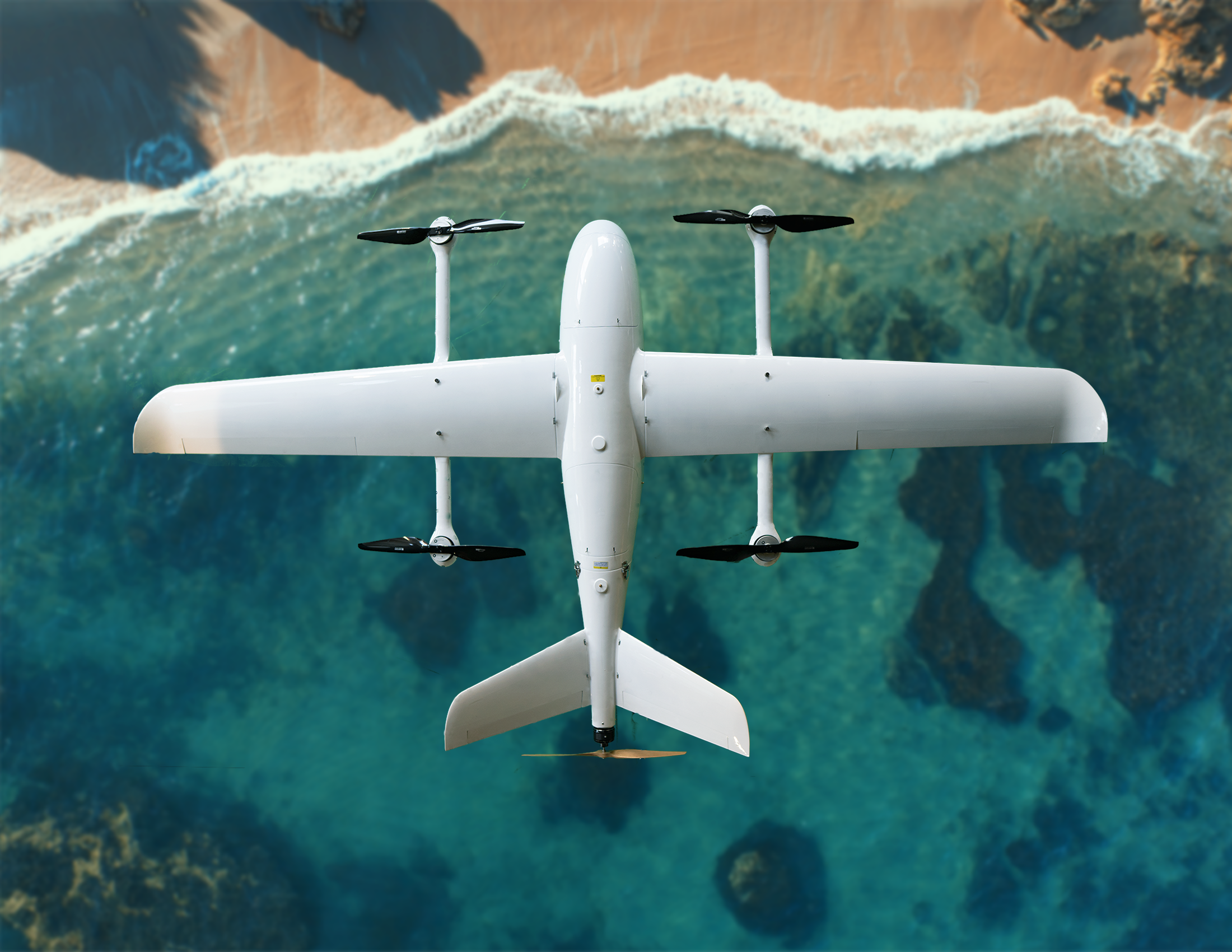Australian-first hydrogen drone to turn the skies green

The Hydrogen to the Skies (H22S) project will design and integrate a new hydrogen propulsion system into a large scale drone, with a first prototype by the end of 2023. Image: AIR Hub SHADE drone.
In summary
- Swinburne’s AIR Hub has been awarded $1.3 million grant from the Australian Government’s Emerging Aviation Technology Partnerships program
- The Hydrogen to the Skies (H22S) project will develop and trial Australia’s first hydrogen propelled drone
- Clean and efficient hydrogen propulsion significantly extends range and payload options, making it a critical turning point for advanced air mobility in regional Australia
Swinburne’s Aerostructures Innovation Research Hub (AIR Hub) will develop and trial Australia’s first hydrogen propelled drone, thanks to a $1.3 million grant from the Australian Government’s Emerging Aviation Technology Partnerships program.
The Hydrogen to the Skies (H22S) project will design and integrate a new hydrogen propulsion system into a large scale drone, working with Australian partners to help spearhead the commercial development of clean, zero emissions uncrewed air systems. The first prototype is expected to be completed before the end of 2023.
AIR Hub Director Dr Adriano Di Pietro said the project would have significant impacts for Australian industry, with the potential for millions of dollars in technology export revenue by the early 2030s.
“With long range, zero carbon emissions and a low noise footprint, hydrogen powered air vehicles represent the future of environmentally sustainable and socially responsible advanced air mobility,” Dr Di Pietro says.
“We are proud to be putting Australia at the cutting edge of this rapidly growing industry and improving outcomes for regional and remote communities across the country and the world”.
Regional impacts, international implications
Hydrogen propulsion is projected to be a critical turning point for advanced air mobility in regional Australia because it significantly extends range and payload options, compared with pure battery electric propulsion systems.
Clean and energy efficient propulsion systems, such as the ones developed by this project, are not only essential in improving regional and remote supply routes but also in meeting Australia’s decarbonisation targets.
The project will demonstrate how hydrogen propulsion can be commercially deployed, paving the way for the regulatory and operational developments needed to better connect regional communities.
Deputy Vice-Chancellor, Research Professor Karen Hapgood said the project connects Swinburne’s research strengths in aerospace, hydrogen and sustainability to fast-track technology which has the capacity to improve the lives of millions.
“This next generation green technology will not only help decarbonise Australia’s aviation industry but will also have positive effects for our regional communities, emergency services and advanced manufacturing sector,” Professor Hapgood said.
“This funding will help grow Australia’s domestic clean aviation technology capabilities and ensure we can continue to create innovative technology for a better world.”
Emerging aviation technology
The project continues AIR Hub’s leading work on Small Hydrogen Aircraft Development & Evolution (SHADE) and commitment to bringing together industry, research and education to solve real-world problems and advance the next generation of engineers, scientists and technicians in clean aviation in Australia.
AIR Hub will work with industry partners to bring Hydrogen to the Skies to life, including collaborating with Swinburne’s Victorian Hydrogen Hub (VH2) on green hydrogen production and storage.
The project is envisaged as the first phase of a strategic aviation initiative to position Australia as an early entrant and global leader in hydrogen propulsion and the technology’s regional application.
Aligned with the National Emerging Aviation Technologies Policy and the National Hydrogen Strategy, the project aims to advance Australia’s goals in new technology development, regulation, safety management and compliance.
-
Media Enquiries
Related articles
-

- Technology
- Aviation
- Sustainability
Swinburne partners with Latrobe City Council to propel Victoria’s Advanced Air Mobility precinct
Swinburne has become the first Foundation Member of the newly established Latrobe Aerospace Technology Precinct.
Friday 03 May 2024 -

- Aviation
How AI can fast track the developments our aviation sector desperately needs
With the help of artificial intelligence, new aircraft designs that meet modern demands could be a reality as soon as 2025 and help alleviate concerns like safety.Thursday 18 January 2024 -

- Technology
- Aviation
Swinburne’s AIR Hub achieves hydrogen flight
Swinburne University of Technology’s Aerostructures Innovation Research Hub (AIR Hub) has successfully completed the first flight of an Australian-developed hydrogen fuel cell electric powered VTOL drone.
Tuesday 24 October 2023 -

- Aviation
AIR Pass accelerating success for aerospace innovation
Swinburne University’s AIR Pass program has accelerated Dovetail’s development and progressed its goal of accelerating decarbonisation in the aviation sector.
Wednesday 16 August 2023 -

- Technology
- Business
AIR Hub opens final AIR Pass funding to drive Australia’s aerospace ecosystem
Swinburne University of Technology’s Aerostructures Innovation Research Hub (AIR Hub) is thrilled to announce the opening of its final round of the AIR Pass program. Designed to fuel the growth of small and medium-sized enterprises (SMEs) and start-ups in the Australian aerospace ecosystem, this initiative will provide eligible projects with up to $50,000 in funding to support their development.
Wednesday 14 June 2023

